
The Best Shoes for Swollen Feet
6 April 2023
Swollen feet can be a common issue for many people and can be both uncomfortable and inconvenient. Don’t worry, we understand, that’s why we’ve pulled together our best tips and tricks for dealing with those pesky swollen feet. Whether you are dealing with swelling due to an underlying medical condition or simply from being on your feet all day, finding the right footwear can make a big difference in managing your symptoms.
In this blog, we will provide you with some advice on how to relieve swollen feet, with a particular focus on shoes for swollen feet that can help alleviate discomfort and provide support. Read on to discover how you can take steps to reduce swelling and improve your comfort level, to keep you walking tall throughout the day.
Why Are My Feet Swollen?
We've all had those days where our shoes feel a tad tighter, and our feet look a little more... shall we say, plump? It's not your imagination; swollen feet are a common experience. There are a myriad of reasons why our feet might puff up. For some of us, it's down to being on our feet all day, letting gravity do its thing. For others, it might be a reaction to hotter weather (yes, those sunny days can sometimes lead to not-so-sunny feet!). Certain medications, pregnancy, or even underlying health conditions can also be culprits. And, of course, let's not forget the occasional sodium-rich meal that makes our feet feel like they've had a bit too much to drink.
Remember, while occasional swelling is usually harmless, if it's a frequent occurrence or accompanied by other symptoms, it might be a good shout to see a doctor. After all, our feet carry us everywhere, so let's make sure they're as happy and healthy as can be!
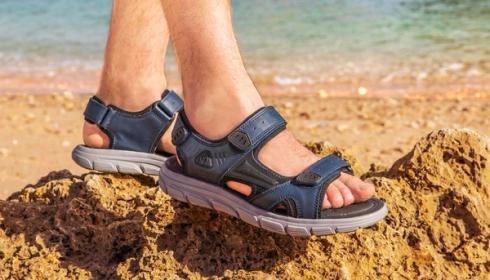
Tips to Prevent Foot Swelling
Swollen feet can be uncomfortable and impede daily activities. Here are some proven methods to prevent and reduce swelling:
- Regular Movement: Ensure periodic foot and ankle exercises, especially if you're seated for extended periods. Rotating the ankles and flexing the toes can promote circulation.
- Elevation: Elevate the feet above heart level when resting, especially after long durations of standing or sitting, to facilitate fluid drainage.
- Stay Hydrated: Drinking adequate water supports the body's natural fluid balance, helping to reduce water retention that can contribute to swelling.
- Limit Sodium Intake: Consuming foods high in salt can exacerbate fluid retention. It's essential to monitor and limit sodium in the diet.
- Massage: Gentle foot massages can stimulate blood flow and help reduce swelling. If possible, consult with a professional masseuse for best results.
- Compression Wear: Compression socks or stockings can apply consistent pressure to the feet and lower legs, helping to prevent fluid from accumulating in the tissues. Always choose the right fit and compression level for optimum benefits.
Implementing these steps can significantly mitigate the discomfort associated with foot swelling, ensuring healthier and more comfortable feet.
Best Footwear for Swollen Feet
Foot swelling can pose a challenge when selecting footwear. The goal is to ensure comfort without compromising on support. Here's what to consider when shopping for shoes suitable for swollen feet:
Adjustable Features
One of the hallmarks of footwear designed with comfort in mind is the inclusion of adjustable features. Shoes with adjustable straps, laces, or even buckles provide the wearer with the flexibility to tailor the fit based on their current needs. This becomes especially crucial for individuals with swollen feet, as the size and shape of their feet might change throughout the day. A shoe that can be easily tightened or loosened ensures that the foot remains secure without feeling constricted.
In essence, adjustable features offer a dynamic solution for fluctuating levels of swelling, granting users the autonomy to dictate their level of comfort at any given moment.
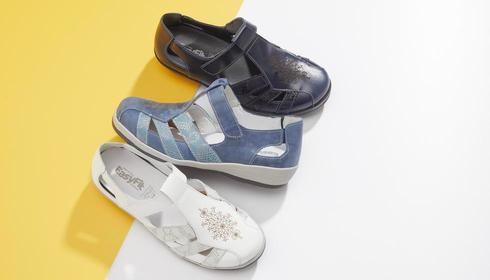
Wide Widths
The width of a shoe plays an indispensable role in overall foot comfort, particularly for those with swollen or naturally broad feet. Standard shoe sizes might not always account for variations in foot width, which can lead to a tight and uncomfortable fit. Shoes that come in wide or extra-wide widths cater specifically to this need. They offer additional room across the ball, arch, and heel of the foot, ensuring that the sides and top of the foot aren't constricted. This extra space can prevent complications like blisters, corns, and exacerbation of foot swelling.
In summary, opting for the right width is as crucial as selecting the correct shoe size, if not more.
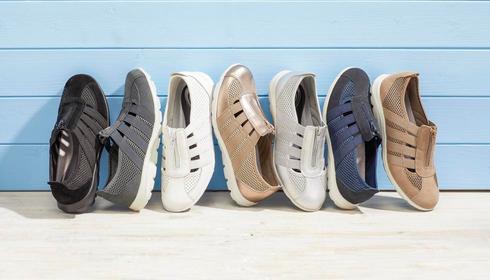
Low Heels
While high heels may offer a certain aesthetic appeal, they aren't always the best choice for foot health, especially for individuals prone to swelling. Low-heeled shoes, on the other hand, encourage a more natural foot posture. They ensure that weight is evenly distributed across the foot, reducing pressure on any single area.
Moreover, a low heel reduces strain on the arch and Achilles tendon, which can alleviate discomfort. For those with swollen feet, low-heeled shoes also ensure stability and ease of movement, making them a preferred choice for daily wear.
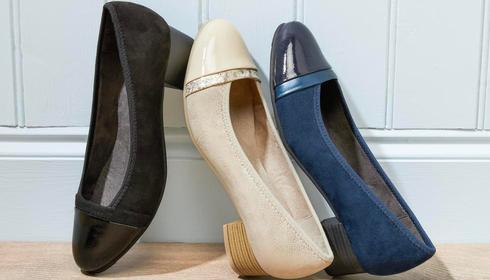
Supportive Arch
The human foot's arch is a marvel of natural engineering, designed to distribute body weight and absorb shock. Proper arch support in footwear is, therefore, paramount. Shoes with a well-constructed and supportive arch ensure that the foot's natural curve is maintained and protected. For individuals with swollen feet, the right arch support can be therapeutic, ensuring that undue stress is not placed on the plantar fascia, the thick band of tissue that runs along the bottom of the foot.
Furthermore, the correct arch support can prevent or alleviate conditions like plantar fasciitis, flat feet, or fallen arches. Footwear that provides appropriate arch support, tailored to an individual's unique foot shape, can lead to improved foot function, reduced pain, and enhanced overall comfort.
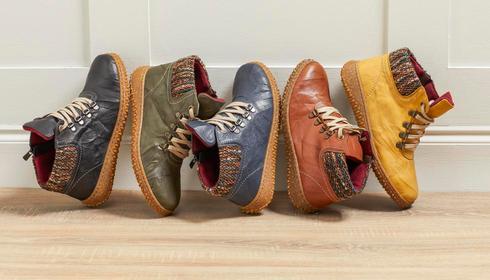
The amalgamation of these features—adjustable elements, wide widths, low heels, and supportive arches—creates footwear that's not only comfortable but also health-conscious. Such attention to detail can greatly enhance the experience for individuals with specific foot needs, including those who grapple with swelling or other foot-related challenges.
It's clear that swollen feet aren't merely a superficial concern; they're a sign from our bodies asking for attention and care. Whether it's adjusting our daily routines, consulting medical professionals, or investing in footwear tailored for comfort and support, addressing the root causes of foot swelling can lead to a more comfortable and active life. Remember, our feet bear the weight of our world, so let's ensure we give them the respect and care they so rightly deserve.
Be Inspired
Don't suffer with your foot health; consult more of our helpful guides below.
